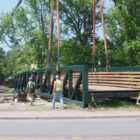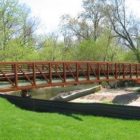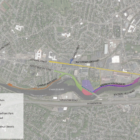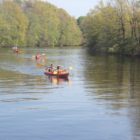Watertown could get $25 million in improvements to roads, parks and paths without putting up a dime, but attendees of a meeting last Thursday were not leaping to seal the deal.
The proposed work would be part of the I-Cubed program, in which a developer – in this case Athenahealth – bonds money from the state to pay for the infrastructure and teams with public entities – the Town of Watertown and the Department of Conservation and Recreation – to do the improvements. The bonds will be paid by the increased tax revenue going to the state from Athenahealth’s campus expansion and the additional jobs it will create. None of the money can be spent on Athenahealth’s property. Thursday night, Athenahealth officials presented the list of projects it would do with the money. They include:
$7.5 million – Arsenal Street: roadway and sidewalk improvements, upgraded traffic lights and timing
$900,000 – Sewer improvements on North Beacon Street and Greenough Boulevard
$6.3 million – Roadway improvements to North Beacon, a cycling and pedestrian path, signal upgrades
$1.7 million – Watertown Square repaving, sidewalk improvements, upgrades to traffic, pedestrian signals and timing, and realigning Charles River Road
$700,000 – Completing the improvements of the Watertown Riverfront Park on the north bank of the Charles River
$1.7 million – Greenough Boulevard: bicycle and pedestrian path upgrades, improvements to the roadway and signal upgrades (including a traffic light at Greenough and North Beacon)
$2.7 million – Squibnocket Park: adding a canoe/kayak launch, a boardwalk and river overlook, and landscaping
$400,000 – School Street/Dexter Avenue/Walnut Street: sight-line improvements and curb realignments
$400,000 – Arsenal Park: extension of the Community Path through the park
$2.7 million – Drainage and parking improvement on Talcott Avenue near the Commander’s Mansion, cosmetic improvements to the Mansion and grounds and realignment of Talcott Avenue, and possibly linking it to either North Beacon or Greenough
The I-Cubed program would be a “win-win” for Athenahealth and the town, said Mark Blair, the company’s Manager of Environment and Construction.





